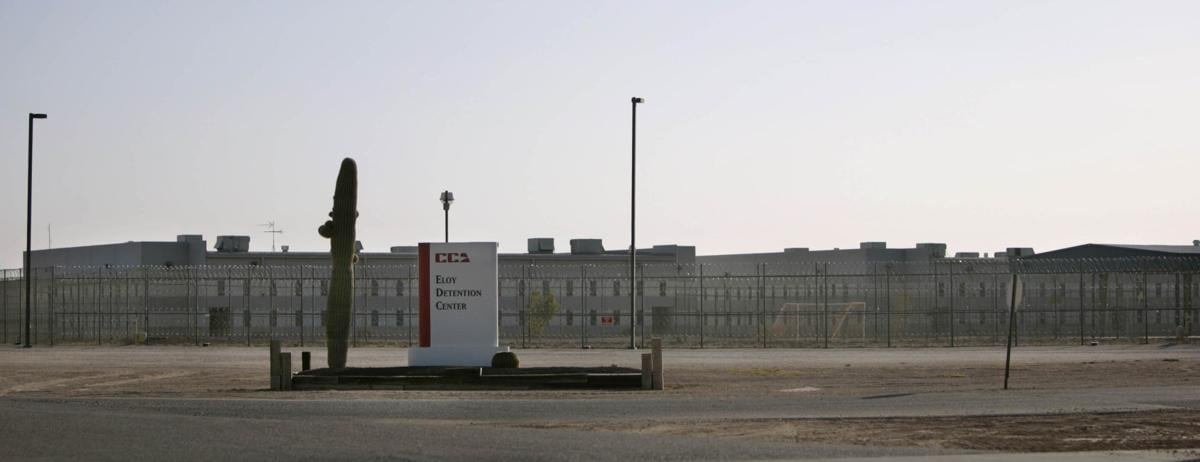The Eloy Detention Center has the highest number of known deaths at any immigration detention center in the country and is the source of frequent sexual assault reports, yet the private facility has not failed an inspection since 2006, a new report by advocates found.
"Under these circumstances, it was expected that the facility's inspections reports would reveal a troubling history of failure to meet standards regarding medical care, suicide prevention and sexual assault prevention," said the report, Lives in Peril: How Ineffective Inspections Make ICE Complicit in Immigration Detention Abuse. "Instead, the inspection reports reveal ICE’s complicity in obscuring the facility’s failure to meaningfully address its violations."
The inspection process Immigration and Customs Enforcement uses is ineffective and often makes it easier for detention facilities to pass, including those with publicly reported human rights abuses, according to the report by the National Immigrant Justice Center and Detention Watch Network. There are also inconsistencies between the two entities that conduct the inspections and discrepancies with the results of the inspections and the rating given to the center.
The report is based on inspection documents for 105 immigration detention centers from 2007 to 2012, including Eloy, obtained after three years of litigation under the Freedom of Information Act.
"Our research confirms our suspicion that the Obama administration failed to improve oversight or gain control over the sprawling immigration detention system," said Claudia Valenzuela, director of detention at the National Immigrant Justice Center, during a press call Wednesday.
A 2014 mandate from Congress requires ICE to fill 34,000 beds with detainees. The government has spent $2.8 billion on detention since 2006, when a bed quota was first implemented, the U.S. Commission on Civil Rights has reported.
ICE officials said they will review the report.
However they add that the agency "remains committed to ensuring that all individuals in our custody are held and treated in a safe, secure and humane manner, and that they have access to legal counsel, visitation, recreation, and quality medical, mental health and dental care.”
Based on the inspection reports, the groups found that:
- Inspections and oversight processes are not readily available;
- There is a lack of independent oversight because both entities that conduct inspections are paid or vetted by ICE;
- ICE inspections don't adequately assess the conditions of detained immigrants;
- and inspections are designed to facilitate passing ratings, not identify or address violations.
The inspections are important because they are used to generate the center's rating. If a facility fails an inspection two times in a row, ICE is mandated by Congress to stop contracting with that center. But since the law took effect in 2009, the report said, no facility has failed twice in a row.
Reports from detainees of inadequate medical care, poor food quality and mistreatment at Eloy are not unheard of, those who work with immigrant detainees say.
"One common issue, no matter what your health problem is, they tell you to drink water and give you an aspirin," said Marjorie King, with St Michael and All Angels Church, who visits detainees at Eloy.
"One man was suicidal and they put him in isolation," she said, "it helped ICE so the man didn't commit suicide, but it didn't help his mental condition." The quality of food is another issue, she said. She has brought some of these issues up with the center's officials and is hopeful with the new management.
Based on reports the National Immigrant Justice Center received, Eloy has not failed an Enforcement Removal Operations inspection, one of two entities that conduct inspections, in nearly the last decade. ICE didn't provide the 2010 inspection for Eloy, the authors said, and they don't know if it's because the facility was not inspected or because the agency failed to comply with the court order.
Since 2012, Eloy has been inspected six times, ICE has said, and has been found in compliance.
"The fact that it has been inspected six times and found to continue to be in compliance is not very reassuring," Valenzuela said, "given, for example, that the suicide watch room contains objects that could be used to commit suicide."
Eloy has come under increasing scrutiny regarding its suicide prevention standards and monitoring of people in suicide watch given the number of people who've killed themselves, including the latest case of a Mexican national this summer who committed suicide by stuffing one of his knee-high socks down his throat.
The man's death led to a request for a thorough investigation from U.S. Rep. Raúl Grijalva.
“It’s no secret that the policies pursued by ICE are detaining innocent immigrants and perpetuating a culture of abuse,” Grijalva said in a written statement.
“I saw this abuse firsthand when I toured detention facilities earlier this year, and this new report only further highlights why so many of us are demanding our government end these unconscionable practices," he said. "The federal government must be held responsible for its actions, which is why I called for the Department of Justice to investigate deaths at Eloy detention center in Arizona."
In the last several years ICE has taken steps to address some concerns, agency officials said. Since 2009, it created an oversight office, established an on-site compliance program where monitors provide headquarters with weekly reports documenting problems. It also created a monitoring council to review issues at the centers and worked to standardize detention services contracts.
At Eloy, ICE officers conduct daily housing unit visits to ensure compliance, the agency has said. One full-time ICE detention services manager and ICE health services corps medical staff are assigned to the center.
"ICE’s inspection process is fundamentally broken," said Mary Small, from Detention Watch Network. "There are gaps between what we know happened at facilities and what we know from the inspections."
The report makes three recommendations to ICE: increase transparency and oversight of the inspection process, improve the quality of inspections and prohibit facilities to take an à la carte approach to compliance.





